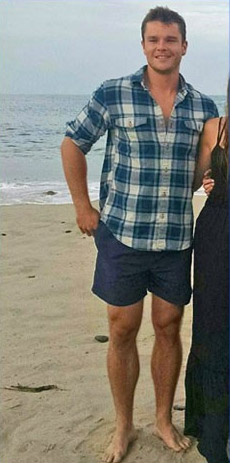“It shows how fragile life is, and I’m grateful I had such amazing treatment and care.”
With the right orthopaedic surgery, Tim Kiernan recovered from extensive hip damage
Source: Tim Kiernan
It was September 2012, and Tim Kiernan was beginning his education at Villanova University. Like many other freshmen, he planned on playing sports, wanted to rush a fraternity and was ready to enjoy college.
“Enjoying college” is how he found himself on a rooftop at a party one evening, making new friends.
The Big Fall
“I’m not totally sure how it happened,” Tim says. “I just sort of slipped off the roof and tumbled to the ground. I got up and started walking around, telling everyone I was fine.”
He wasn’t. He had fallen 28 feet. A friend trained in first aid told him he needed to stop walking. A police officer happened to be nearby and he called an ambulance.
The next thing Tim remembers is waking up in a hospital bed with one leg suspended in the air.
“I didn’t know what was going on, but the first question I asked was, 'Which hospital am I in?’ The nurse told me I was at Penn Medicine, and I immediately breathed a sigh of relief and said, ‘I’m good.’”

The Right Treatment, on the Spot
Samir Mehta, MD, chief of the Division of Orthopaedic Trauma at Penn Medicine, came onto the scene in the emergency room, where he discovered that Tim had a fractured acetabulum (part of the pelvic bone), a fractured pelvic ring, a lacerated spleen, damage to his kidney and a badly dislocated hip.
After waiting a few days for Tim’s spleen to stop bleeding, Dr. Mehta was able to perform surgery, which included complex hip socket and pelvic reconstructions. He had a complex fracture of his acetabulum (hip socket). If untreated, the femoral head (hip) would easily fall out of place (dislocate).
Tim had a large incision made over his hip. The muscles were moved out of the way, the sciatic nerve was isolated and protected, and the hip socket was repaired with plates and screws.
“At Penn, Tim got the right care immediately with a fairly short course of treatment,” Dr. Mehta says. “That can mean better outcomes and a better quality of life for the patient.”
Racing Down Recovery Road
Dr. Mehta prescribed a 3-month plan to get Tim walking and moving again. Each week, Tim was supposed to gradually increase his activity—5%, to 10%, to 15%, and so on. But that wasn’t enough for Tim. “I’d always been an athlete, and I didn’t want to just sit around. I had physical therapy a few days a week, but I made sure to exercise every day,” says Tim.
“We started with walking, and I didn’t do any weight-bearing exercise in the first month. After that, I began doing 30-minute bike rides and strengthening my core with exercises like planks.
And, of course, Tim constantly checked in with Dr. Mehta. “Not only is he a great doctor, but he’s also a really good guy. We would talk sports, he would joke around with me, he’d ask me about my family,” he recalls.
Help Through Hurdles
There were several challenges that came with recovery, from physical ones like learning to walk again, to mental ones like putting mind over pain, since Tim didn’t want to rely on pain medication.
Dr. Mehta helped Tim with another big challenge: not re-injuring himself.
“I wanted to get better quickly, almost too quickly,” Tim says. “I’d go in and blow Dr. Mehta’s mind with how quickly I was recovering and how well I was doing.
“I was so impressed," Dr. Mehta recalls. "But I’d always caution him to follow protocols. I’d tell him, ‘You’re working hard, which is good, but this is a marathon, not a sprint.’ With his hard work, he was able to get back to normal functioning, even after such significant injuries.”
An Inside Look at Penn Medicine
With the challenges came silver linings. Tim loved being able to get involved with his own care and seeing firsthand the great things he had always heard about Penn.
He’s also extremely grateful for his care and treatment.“The day after I fell, I heard about a girl at another college nearby who fell out of a window and, sadly, passed away,” he said. “It shows how fragile life is, and I’m grateful I had such amazing treatment and care.”
Back to Normal-ish
Tim still sees a chiropractor every week or so, and he probably won’t have a completely normal gait unless he continues to do his home therapy every day. At times, he does feel some pain, and he might need a hip replacement when he gets much older.
But from the outside, you would never know. Tim is back to running and playing sports. He joined a fraternity, he’s studying criminal justice, and he has held several jobs. He’s even back on rooftops—sometimes. But carefully.
And Tim says he has Dr. Mehta to thank for his successful recovery. “If anyone needs orthopaedic surgery in Philly, they should go to Dr. Mehta and his team,” Tim says. “He is such a kind man, an extremely qualified and great doctor. I emailed him a few days ago thanking him again, and 3 years later, he still emailed me back within just a few hours. He truly cares about his patients.”